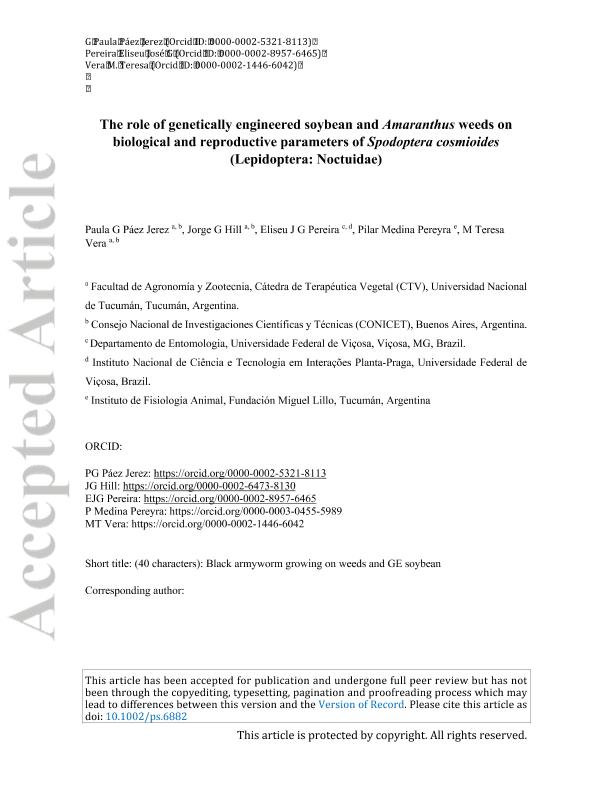Artículo
The role of genetically engineered soybean and Amaranthus weeds on biological and reproductive parameters of Spodoptera cosmioides (Lepidoptera: Noctuidae)
Páez Jerez, Paula Gabriela ; Hill, Jorge Guillermo
; Hill, Jorge Guillermo ; Pereira, Eliseu J. G.; Medina Pereyra, Pilar; Vera, María Teresa
; Pereira, Eliseu J. G.; Medina Pereyra, Pilar; Vera, María Teresa
 ; Hill, Jorge Guillermo
; Hill, Jorge Guillermo ; Pereira, Eliseu J. G.; Medina Pereyra, Pilar; Vera, María Teresa
; Pereira, Eliseu J. G.; Medina Pereyra, Pilar; Vera, María Teresa
Fecha de publicación:
05/2022
Editorial:
John Wiley & Sons Ltd
Revista:
Pest Management Science
ISSN:
1526-498X
Idioma:
Inglés
Tipo de recurso:
Artículo publicado
Clasificación temática:
Resumen
BACKGROUND: In soybean fields containing insecticide- and herbicide-resistant genetically engineered varieties, some weed species have increasingly become difficult to manage and may favor the population growth of secondary pests like Spodoptera cosmioides (Walker) (Lepidoptera: Noctuidae). To test this hypothesis, we measured life-history traits, population growth parameters and adult nutrient content of S. cosmioides reared on foliage from four Amaranthus species, from Cry1Ac Bt and non-Bt soybean varieties, and on meridic artificial diet. RESULTS: Larvae reared on A. palmeri and A. spinosus had a shorter development time (5–7 days) than larvae raised on the soybean varieties and A. hybridus. Armyworm survival probability was zero on A. viridis and highest (80% and 71%) on soybeans and A. palmeri. The latter and the artificial diet produced the heaviest larvae and pupae, in contrast to the non-Bt soybean variety. Body nutrient content diverged mostly for adults reared on artificial diet compared with those raised on the soybean varieties. The intrinsic rate of population increase (overall fitness) was 27.88% higher for the armyworms on A. palmeri, Cry1Ac Bt soybean and artificial diet compared with those on non-Bt soybean, A. spinosus and A. hybridus. CONCLUSIONS: Cry1Ac soybean fields infested by some Amaranthus weeds, especially A. palmeri, are conducive to the population growth of S. cosmioides. Integrated pest management programs may be needed to properly manage S. cosmioides in soybean fields, with surveillance for population peaks and judicious control measures when needed.
Archivos asociados
Licencia
Identificadores
Colecciones
Articulos(CCT - NOA SUR)
Articulos de CTRO.CIENTIFICO TECNOL.CONICET - NOA SUR
Articulos de CTRO.CIENTIFICO TECNOL.CONICET - NOA SUR
Citación
Páez Jerez, Paula Gabriela; Hill, Jorge Guillermo; Pereira, Eliseu J. G.; Medina Pereyra, Pilar; Vera, María Teresa; The role of genetically engineered soybean and Amaranthus weeds on biological and reproductive parameters of Spodoptera cosmioides (Lepidoptera: Noctuidae); John Wiley & Sons Ltd; Pest Management Science; 78; 6; 5-2022; 2502-2511
Compartir
Altmétricas



